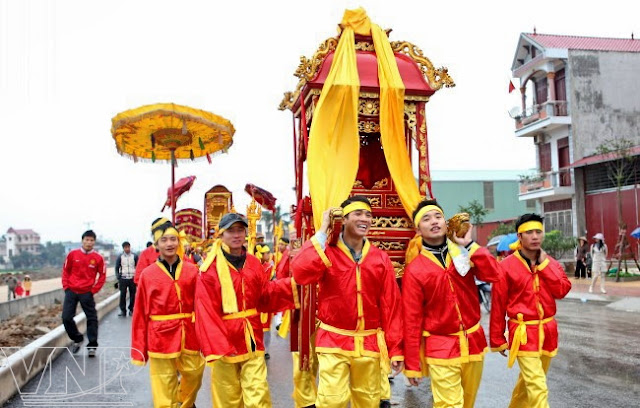In early January according to the lunar calendar, people
flock to the Lim Festival in Tien Du District, Bac Ninh Province to
enjoy the sweet melodies of Quan ho (love duet songs).
The most striking feature of Lim Festival 2013 is the procession of four villages,
including Lo Bao, Dinh Ca, Due Nam and Due Khanh in Noi Due Commune.
The procession from Dinh Ca Village’s Communal House to Lim Hill.
An offering ceremony at Lo Bao Village’s Communal House.
Offering incenses to Duke Nguyen Dinh Dien at Hong An Tomb.
Offerings to Duke Nguyen Dinh Dien who had services rendered to the court
and donated his land and money to Noi Due to restore pagodasand communal
houses and preserve the traditional cultural features of the Lim area.
Tens of thousands of people flock to Bac Ninh to participate in the Lim Festival.

Quan ho singers at Lim Festival 2013.
Wrestling, a traditional game at the Lim Festival.
Swinging at the Lim Festival.
This year, the Lim Festival
took place during February 21-22 (January 12-13 of the lunar calendar)
in the communes of Noi Due and Lien Bao and Lim Town. However, the
centre of the festival was on Lim Hill. On the main festival day, the
13th of the lunar calendar, many solemn rites were held in the communal
houses of Dinh Ca and Lo Bao that drew a large number of locals and
tourists.
The most striking feature of this festival was the procession of four villages, including Lo Bao, Dinh Ca, Due Nam and Due Khanh in Noi Due Commune with the participation of over 800 people. The procession started from Dinh Ca Village’s Communal House to Lo Bao Village and then to the tomb area of Duke Nguyen Dinh Dien on Lim Hill where the offering ceremony and official rituals were held.
The most striking feature of this festival was the procession of four villages, including Lo Bao, Dinh Ca, Due Nam and Due Khanh in Noi Due Commune with the participation of over 800 people. The procession started from Dinh Ca Village’s Communal House to Lo Bao Village and then to the tomb area of Duke Nguyen Dinh Dien on Lim Hill where the offering ceremony and official rituals were held.
The most striking feature of Lim Festival 2013 is the procession of four villages,
including Lo Bao, Dinh Ca, Due Nam and Due Khanh in Noi Due Commune.
The procession from Dinh Ca Village’s Communal House to Lim Hill.
An offering ceremony at Lo Bao Village’s Communal House.
Offering incenses to Duke Nguyen Dinh Dien at Hong An Tomb.
Offerings to Duke Nguyen Dinh Dien who had services rendered to the court
and donated his land and money to Noi Due to restore pagodasand communal
houses and preserve the traditional cultural features of the Lim area.
Tens of thousands of people flock to Bac Ninh to participate in the Lim Festival.
Going to the Lim Festival,
people also want to enjoy the sweet melodies of Quan ho in the area of
Kinh Bac which is considered the cradle of this artistic genre. During
the festival, besides the major stage, the festival’s organization board
also created four others where a series of Quan ho songs, such as “Moi
trau” (Inviting a quid of betel and areca), “Vao chua” (Going to the
pagoda), “Gia ban” (Goodbye to friends) and “Ngoi tua man thuyen”
(Sitting near the boat’s side) were performed. Furthermore, Quan
ho singing performances were also held at the courtyard of communal
houses and pagodas, houses of artists and on boats in many villages,
such as Lung Giang, Lung Son, Due Dong, Dinh Ca, Lo Bao, Due Khanh, Hoai
Thi, Hoai Thuong, Hoai Trung and Ba Uyen.
Quan ho singers at Lim Festival 2013.
Wrestling, a traditional game at the Lim Festival.
Swinging at the Lim Festival.
The
festival also included many traditional games such as swinging,
wrestling, beating earthenware pots, blind’s man bluff, playing human
chess and the puppets of Dong Ngu on the central stage. It also had many
stalls selling souvenirs, Quan ho dresses, Quai thao hats and Dong Ho
folk paintings that helped create a new space for this year’s Lim
Festival .
VNP


No comments :
Post a Comment